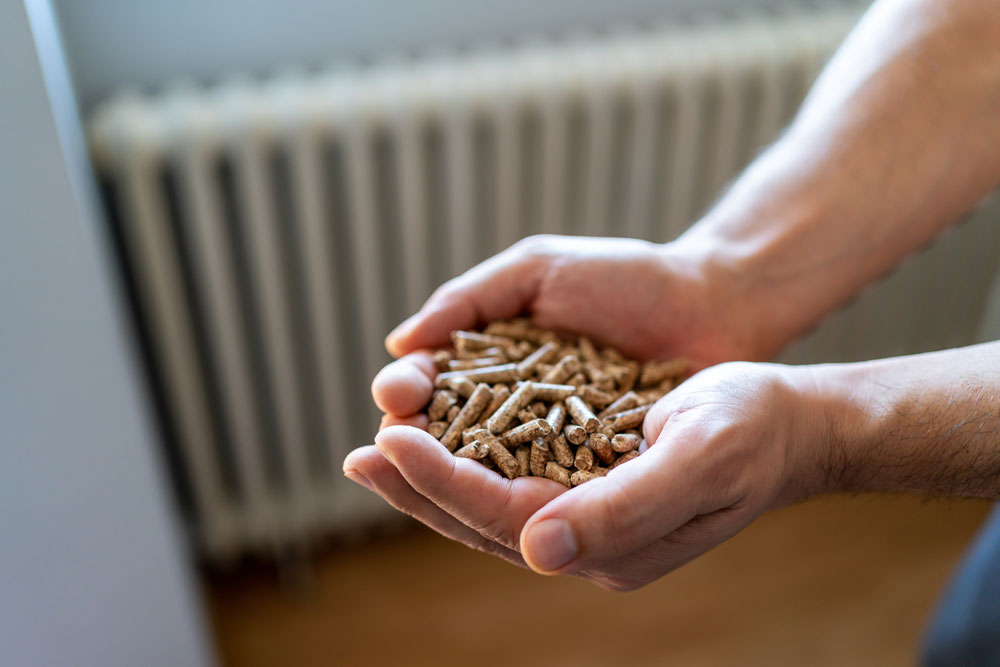Studies have shown that wood pellet fuel, which is also known as biomass, produces significantly fewer greenhouse gas emissions than fossil fuels.
‘It’s much better,’ said William Strauss, president of FutureMetrics, a consulting firm for the pellet industry in Bethel. ‘Burning wood releases essentially carbon dioxide, but there’s no sulfur. Coal has sulfur in it, [so you have to] run these big scrubbers at the back end of the coal station to clean the sulfur out. Pellet stoves are also much cleaner than wood stoves in terms of particulate emissions.’
Seventy percent of Maine households use heating oil to stay warm through the winter, the highest of any state. Replacing fossil fuel-based heating systems with pellet boilers would help to reduce fossil fuel consumption considerably in the state, Strauss said.
‘Maine is accustomed to having 68 percent of every dollar leave the state for energy,’ said Les Otten, owner and co-Founder of Maine Energy Systems, which supplies homes with pellet boilers and pellets. ‘Maine’s forest from an energy standpoint is equal to Saudi Arabia’s oil fields, except our forest completely replenishes itself. It helps with decarbonization but it provides a tremendous amount of jobs.’
Pellet fuel also takes advantage of materials that would normally be considered waste from processing timber. Strauss described pellet mills as the ‘bottom feeders of the forestry industry,’ using the leftovers from processing higher value timber products such as furniture and floor boards.
This is especially true given the paper mill closures that have happened across the state, Otten said.
‘Since the demise of the pulp and paper industry there’s even less demand for that low grade material,’ Otten said. ‘There’s a lot of potential feedstock to make pellets in Maine, and it’s not all taken advantage of.’
Harvesting pellet fuels could also promote more sustainable management of Maine’s forests — and improve their ability to suck greenhouse gases out of the air.
‘Basically, the state of Maine’s forests is that the forests are overstocked or overcrowded,’ said Adam Daigneault, associate professor of forest policy and economics at the University of Maine.
‘That’s leaving trees to outcompete each other and the forests aren’t as healthy or growing as fast as they could. If some of those forests were managed in a way that the biomass is removed or freed up, it would allow opportunities for the trees to grow faster. That would increase the rate of carbon sequestration.’
The wood would still have to be sourced sustainably, Strauss said, to ensure you are not taking out more trees than are being put back into the forests.
Even with sustainable forest management, some environmental groups see wood pellet fuel as a band aid solution. They argue that Maine should focus on renewable energy solutions like solar and wind, and electric sources of heat that are powered by these renewable energy sources.
When it comes to heating, Jack Shapiro, Climate & Clean Energy Program Director of the Natural Resources Council of Maine, sees electric heat pumps as a better long term solution for heating. Most newer models work well in the cold, whereas older heat models couldn’t function at some of Maine’s lowest winter temperatures, and they also provide air conditioning as Maine’s temperatures continue to rise during the summer.
Still, Shapiro thinks pellet stoves could be a complement to electric heat pumps.
‘A lot of people don’t feel quite ready to go fully electric in their heating or they just really like the radiant heat from a wood stove, and that’s ok,’ he said. ‘They could be a good supplement to electric heat pumps especially if they’re displacing fossil fuels like propane or natural gas for like most people in Maine.’
Read the full article from the Bangor Daily News here: Switching to a pellet stove helps Maine in more ways than one by Sam Schipani
